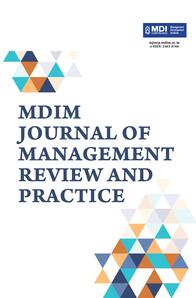
1 Department of Management, St. Joseph’s University, Bangalore, Karnataka, India
Creative Commons Non Commercial CC BY-NC: This article is distributed under the terms of the Creative Commons Attribution-NonCommercial 4.0 License (http://www.creativecommons.org/licenses/by-nc/4.0/) which permits non-Commercial use, reproduction and distribution of the work without further permission provided the original work is attributed.
This article is an exploratory study into how hybrid work evolved from work from home and remote working and is the way forward for organisations with the advent of Artificial Intelligence. The researchers have studied previously published data and looked at various secondary sources of study especially newspapers and journals to understand the effect of COVID-19 work-from-home mandates and how it was possible as it was already in effect in organisations in a different manner. In this article, the meaning of the three types of work, that is, remote, work from home, and hybrid work, are looked at, with an emphasis on what limitations employers and employees have found in the first two methods that have served as a catalyst to start the modern method of Hybrid work. The article also looked at the origins of the concept of hybrid work and how it was a natural evolution, as a solution to the limitations that exist in remote working and working from home of employees.
Management, behaviour management, human resource management, sociology of work and organisations
Al-Habaibeh, A., Watkins, M., Waried, K., & Javareshk, M. B. (2021). Challenges and opportunities of remotely working from home during COVID-19 pandemic. Global Transitions, 3, 99–108. https://doi.org/10.1016/j.glt.2021.11.001
Azam, O. (2018). Flexible timing and its effects. https://www.researchgate.net/publication/323278562_Flexible_timing_and_its_effects
Boland, B., De Smet, A., Palter, R., & Sanghvi, A. (2020). Reimagining the office and work life after COVID-19.
Gautam, V. (2023). After Mark Zuckerberg’s Meta, Amazon CEO warns of firing employees who don’t work from office. India Times. https://www.indiatimes.com/worth/news/amazon-ceo-warns-employees-of-job-loss-if-they-dont-work-from-office-613436.html
Hamingson, N. (2023). Communication technology and inclusion will shape the future of remote work. Business News Daily. https://www.businessnewsdaily.com/8156-future-of-remote-work.html
Hopkins, J., & Bardoel, A. (2023). The future is hybrid: How organisations are designing and supporting sustainable hybrid work models in post-pandemic Australia. Sustainability, 15(4), 3086. https://doi.org/10.3390/su15043086
Howington, J. (2022). Remote work statistics & trends: The latest in remote work. Flexi Jobs. https://www.flexjobs.com/blog/post/remote-work-statistics/
Kagerl, C., & Starzetz, J. (2023). Working from home for good? Lessons learned from the COVID-19 pandemic and what this means for the future of work. Journal of Business Economics, 93(1–2), 229–265. https://doi.org/10.1007/s11573-022-01124-6
Livemint. (2023). https://www.livemint.com/news/india/gurugramgurgaonviolence-companies-ask-employees-to-work-from-home-due-to-clashes-11690947952804.html
Ozimek, A. (2020). The future of remote work. SSRN Electronic Journal. https://doi.org/10.2139/ssrn.3638597
Yang, L., Holtz, D., Jaffe, S., Suri, S., Sinha, S., Weston, J., Joyce, C., Shah, N., Sherman, K., Hecht, B., & Teevan, J. (2021). The effects of remote work on collaboration among information workers. Nature Human Behaviour, 6(1), 43–54. https://doi.org/10.1038/s41562-021-01196-4